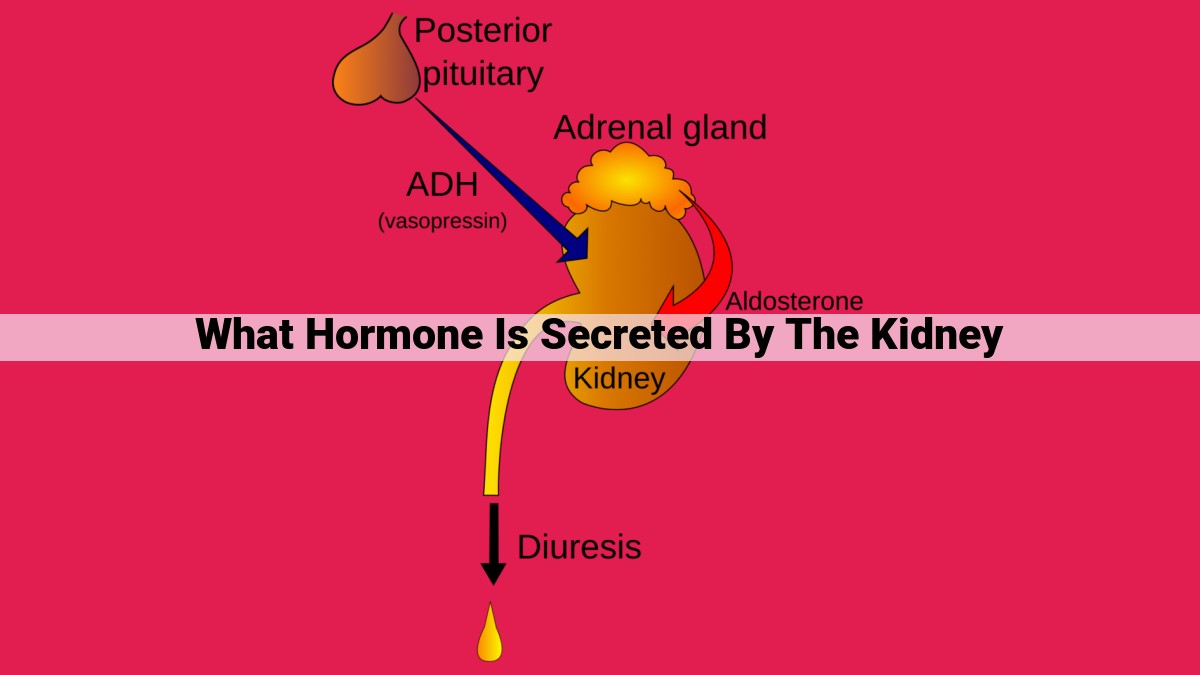Unlocking The Hormonal Functions Of The Kidneys: Essential Roles In Bodily Health

The kidneys secrete several crucial hormones that play significant roles in maintaining bodily functions. Erythropoietin stimulates red blood cell production, regulating oxygen transport. Renin regulates blood pressure by influencing the release of angiotensin and aldosterone. Additionally, the kidneys produce calcitriol, essential for calcium absorption, and prostaglandins, involved in blood flow and electrolyte balance. These hormones collectively contribute to homeostasis, ensuring optimal oxygen delivery, blood pressure regulation, and mineral balance.
The Kidneys: An Unsung Hormonal Powerhouse
Your kidneys, those bean-shaped wonders, do more than just filter waste from your blood. They’re also a hormonal powerhouse, churning out essential chemicals that keep your body ticking like a well-oiled machine.
The Kidney’s Vital Symphony of Functions
Kidneys are the maestros of homeostasis, maintaining a delicate balance in your body. Beyond cleaning your blood, they also regulate blood pressure, produce red blood cells, and exert influence on bone health. The hormones they secrete weave an intricate tapestry, ensuring your bodily symphony plays in perfect harmony.
Erythropoietin: Orchestrating Oxygen Delivery
When your kidneys sense a shortage of oxygen in your blood, they step up to the podium and conduct the production of erythropoietin. This hormone signals your bone marrow to churn out more red blood cells, the oxygen-carrying heroes of your circulatory system.
Renin: Regulating Blood Pressure Like a Master Conductor
Maintaining a steady blood pressure is critical for the harmony of your body. The kidneys keep a watchful eye on blood pressure, releasing renin when it dips too low. Renin triggers a cascade of reactions, culminating in the production of angiotensin and aldosterone, hormones that work together to elevate blood pressure.
Beyond the Headlines: Additional Hormonal Harmonies
The kidneys’ hormonal repertoire doesn’t end there. They also produce calcitriol, essential for bone health, and prostaglandins, which play a role in regulating blood flow and other bodily processes. These hormones, like skilled musicians, add depth and nuance to the kidney’s hormonal symphony.
Erythropoietin: The Oxygen Regulator
In the realm of our intricate bodies, where life’s symphony plays, the kidneys stand as unsung heroes, quietly performing a myriad of essential tasks. Among their many responsibilities, they orchestrate the production of vital hormones, one of which is the life-giving erythropoietin.
Oxygen’s Guardian
Erythropoietin, aptly named “red cell producing hormone,” plays a pivotal role in ensuring a steady supply of oxygen to our tissues. It stimulates red blood cell production in the bone marrow, the factory where these crimson carriers are forged.
Hemoglobin, the iron-rich protein within red blood cells, binds to oxygen and transports it to every nook and cranny of our bodies. Without adequate erythropoietin, hemoglobin levels plummet, leading to a condition known as anemia. This oxygen deficiency can leave us feeling weak, breathless, and fatigued.
The Kidneys’ Role
The kidneys are finely tuned to detect changes in oxygen levels in the blood. When oxygen levels drop, the kidneys release erythropoietin to rally the bone marrow into action, replenishing our army of red blood cells and restoring oxygen flow.
This intricate hormonal dance ensures a steady supply of oxygen to our cells, powering our bodies and keeping us healthy and vibrant. Without the tireless efforts of erythropoietin and the kidneys, our bodies would quickly succumb to the suffocating grip of oxygen deprivation.
Renin: The Blood Pressure Regulator
In the intricate orchestra of our bodies, the kidneys play a pivotal role not only as waste-removal experts but also as endocrine powerhouses. One of the most crucial hormones they produce is renin, a master regulator of blood pressure.
The Role of Renin
When blood pressure dips or sodium levels in our bodies decrease, the kidneys spring into action. They secrete renin, an enzyme that triggers a cascade of hormonal reactions culminating in an increase in blood pressure.
Renin’s Interplay with Angiotensin and Aldosterone
Renin sets off a chain of events that involves two other hormones: angiotensin and aldosterone. Angiotensin raises blood pressure by causing blood vessels to constrict, while aldosterone promotes water and sodium reabsorption in the kidneys, leading to increased blood volume and pressure.
The Renin-Angiotensin-Aldosterone System (RAAS)
The interplay between renin, angiotensin, and aldosterone forms the Renin-Angiotensin-Aldosterone System (RAAS), a complex regulatory network that ensures blood pressure remains within a healthy range.
Medical Implications
Understanding the role of renin and the RAAS is crucial in managing conditions like high blood pressure. Doctors can prescribe medications that target specific components of the system, such as ACE inhibitors or angiotensin receptor blockers, to regulate blood pressure effectively.
The secretion of renin by the kidneys is a testament to their vital role beyond waste removal. As the master regulator of blood pressure, renin maintains homeostasis, ensuring the proper flow of oxygen and nutrients throughout our bodies. Its intricate interplay with angiotensin and aldosterone highlights the body’s remarkable symphony of hormonal balance.
Additional Hormones Secreted by the Kidneys
Beyond erythropoietin and renin, the kidneys are also responsible for producing a diverse range of other hormones that play crucial roles in maintaining homeostasis. One such hormone is calcitriol, also known as the active form of vitamin D. Calcitriol is essential for regulating calcium and phosphorus levels in the blood, ensuring the proper mineralization of bones and teeth.
Through a complex interplay with parathyroid hormone and other factors, calcitriol increases the absorption of calcium from the intestines and facilitates its deposition into bone tissue. This action is crucial for maintaining bone health and preventing conditions like osteoporosis. Additionally, calcitriol helps regulate phosphate levels, working in conjunction with parathyroid hormone to prevent phosphate accumulation in the blood.
Another group of hormones secreted by the kidneys are the prostaglandins. These hormone-like substances are involved in a wide range of physiological processes, including blood flow regulation, inflammation, and pain transmission. Specifically, the kidneys produce prostaglandins to help maintain blood flow to the kidneys and regulate sodium excretion. By influencing these processes, prostaglandins contribute to the kidney’s role in blood pressure control and fluid balance.